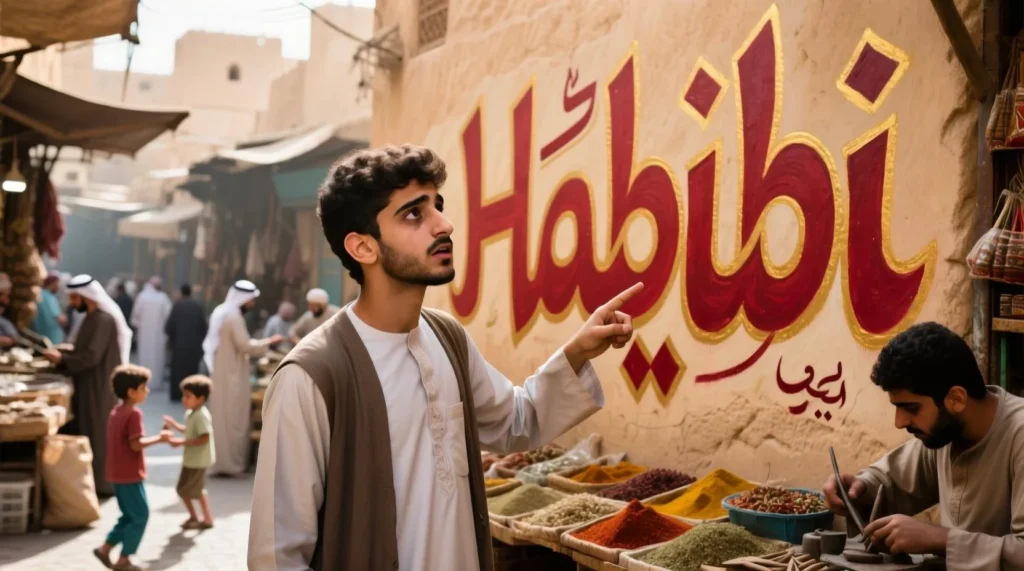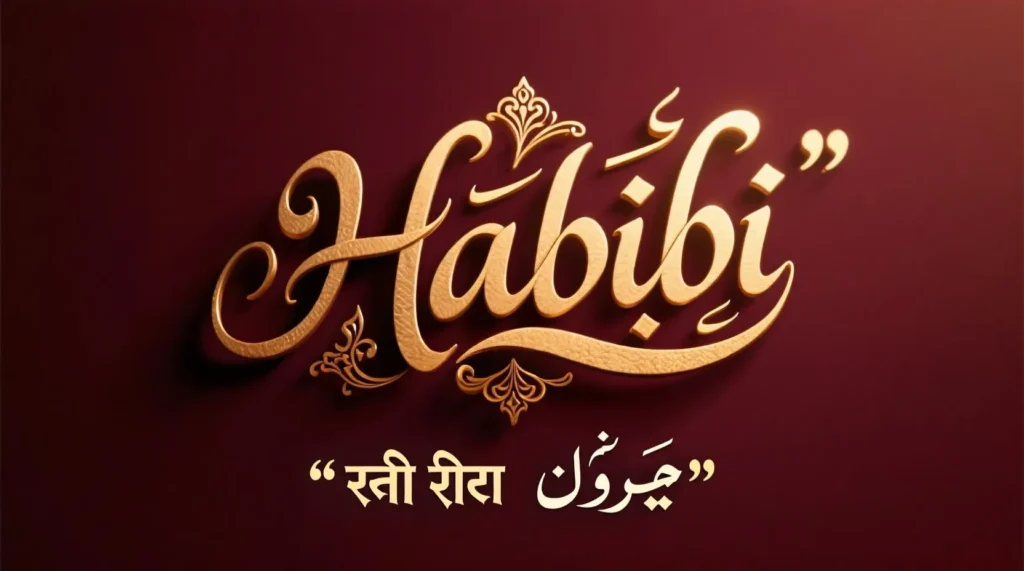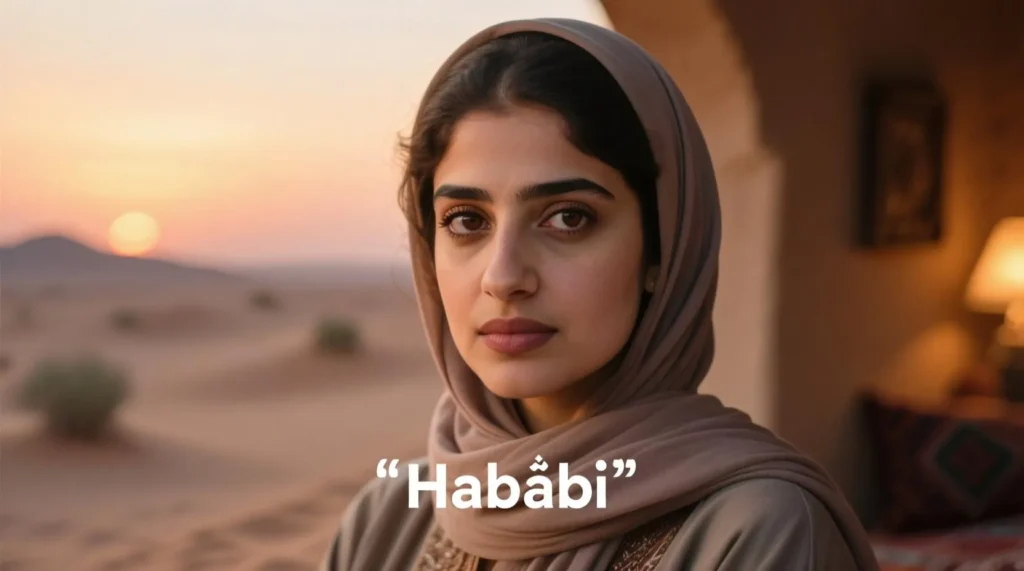Language carries culture, and few words showcase this better than Habibi. If you’ve listened to Arabic music, scrolled through TikTok trends, or even watched Hollywood movies with Middle Eastern characters, you’ve probably come across this word. But what does Habibi really mean? Is it romantic, friendly, or both?
🔥 Rizz Line Generator 🔥
This article dives deep into the habibi meaning, its cultural context, translations in different languages, and its usage in everyday life. Whether you’re learning Arabic, exploring Islamic expressions, or simply curious after hearing “Yalla Habibi” in a song, this guide will give you clear, useful, and fascinating knowledge.
What Does Habibi Mean?

At its core, Habibi (حبيبي) is an Arabic term of endearment. It literally translates to “my love” or “my dear” in English.
- For a male, the word is Habibi.
- For a female, it changes slightly to Habibti (حبيبتي).
The root word “Habib” means “beloved” or “loved one.” Adding the -i at the end makes it possessive, so Habibi = my beloved.
👉 Think of it like calling someone “sweetheart”, “darling”, or “dear” in English.
Habibi Meaning in Arabic

The habibi meaning in Arabic goes beyond romance. It’s often used casually among friends, relatives, and even strangers in a friendly way.
For example:
- A shopkeeper may say “Shukran, Habibi” – “Thank you, my friend.”
- A parent may call their child “Habibi” as a form of affection.
- In love, a partner may say “Habibi” to express intimacy.
Arabic is rich in emotional words, and Habibi is one of the most versatile.
Habibi Meaning in English
When translated, habibi meaning in English is usually “my love” or “my dear.”
But translation doesn’t capture the cultural warmth of the word. Unlike in English, where saying “my love” might sound too personal, in Arabic it can be completely casual.
| Arabic Phrase | Literal English Meaning | Common Usage |
|---|---|---|
| Habibi | My beloved / my love | To a male friend, lover, child |
| Habibti | My beloved (feminine) | To a female friend, lover, daughter |
| Ya Habibi | Oh my beloved | Often in songs, dramatic emphasis |
| Al Habibi | The beloved | Formal, poetic style |
Habibi Meaning in Hindi and Urdu

Because of cultural exchange, Bollywood, and Arabic songs, Habibi is also familiar in Hindi and Urdu-speaking communities.
- Habibi meaning in Hindi – प्रेमी, दोस्त, प्रिय (lover, friend, dear one).
- Habibi meaning in Urdu – میرا پیارا, محبوب, جان (my beloved, my dear).
In both Hindi and Urdu, the word retains its emotional and affectionate tone.
Habibi Meaning to a Girl

When directed to a girl, the correct form is Habibti. However, in casual conversations or songs, people sometimes just say “Habibi” even for women.
For example:
- Boyfriend to girlfriend: “Habibti, I missed you.”
- Friend to female friend: “How are you, Habibti?”
👉 Using “Habibti” instead of “Habibi” shows attention to gender and respect in Arabic grammar.
Popular Variations and Expressions with Habibi
The word “Habibi” often appears with other Arabic expressions, each adding nuance. Let’s break down the most common ones:
Yalla Habibi Meaning
Yalla (يلا) means “let’s go” or “come on.”
So, Yalla Habibi meaning is:
👉 “Come on, my dear” or “Let’s go, my love.”
In pop culture, it’s a catchy phrase used in music and dance.
Yalla Habibi meaning in English can be both playful and romantic depending on context.
Wallah Habibi Meaning
- Wallah (والله) = “I swear to God.”
- So, Wallah Habibi meaning is:
👉 “I swear, my friend” or “I promise, my dear.”
Wallah Habibi meaning in Arabic often adds sincerity or emphasis, especially in friendly or emotional conversations.
Ya Habibi Meaning
Adding “Ya” before a name or word in Arabic is like saying “Oh”.
So Ya Habibi = “Oh my love” or “Oh beloved.”
This is very common in Arabic songs, poetry, and even memes.
Shukran Habibi Meaning
- Shukran = “Thank you.”
- Shukran Habibi = “Thank you, my dear.”
It’s both polite and affectionate.
Marhaba Habibi Meaning
- Marhaba = “Hello.”
- Marhaba Habibi = “Hello, my dear.”
This is a common greeting in Arabic cultures.
Inshallah Habibi Meaning
- Inshallah (إن شاء الله) = “God willing.”
- Inshallah Habibi = “God willing, my dear.”
This phrase blends hope, faith, and affection.
Assalamualaikum Habibi Meaning
- Assalamualaikum = “Peace be upon you.”
- Assalamualaikum Habibi = “Peace be upon you, my dear.”
This is a warm, respectful, and loving greeting, often used in Islamic contexts.
Hamood Habibi Meaning
“Hamood Habibi” became an internet meme from an Arabic children’s song. It means “Hamood, my dear.”
Though lighthearted, it introduced millions of non-Arabic speakers to the affectionate tone of “Habibi.”
My Habibi Meaning
When someone says “My Habibi”, it emphasizes possession:
👉 “You are my love.”
This is often used in romantic relationships.
Al Habibi Meaning
The word “Al” in Arabic means “the.”
So Al Habibi = “The beloved.”
This is more formal, poetic, and rarely used in everyday speech, but often appears in literature.
Habibi Meaning in Islam
In Islamic context, “Habibi” can take on a spiritual meaning. Many Muslims use it to express love for Prophet Muhammad (Peace Be Upon Him).
For example, Islamic poetry may call the Prophet “Ya Habibi” – “O my beloved.”
Thus, Habibi meaning in Islam isn’t just romantic—it’s also a deeply spiritual term of love and devotion.
Habibi as Slang
In modern pop culture, especially music, habibi meaning slang often refers to “babe,” “darling,” or “sweetheart.”
Examples:
- In club songs: “Dance with me, Habibi.”
- In casual slang: A guy might call his buddy “Habibi” like saying “bro.”
It has crossed cultural boundaries, showing up in Bollywood, TikTok, Instagram captions, and memes.
How to Say “I Love You” in Arabic (Using Habibi)
If you want to express love in Arabic, you can combine “Habibi” with “I love you.”
| Arabic | Transliteration | English Translation |
|---|---|---|
| أحبك حبيبي | Uhibbuka Habibi (to male) | I love you, my dear (male) |
| أحبك حبيبتي | Uhibbuki Habibti (to female) | I love you, my dear (female) |
So, saying “I love you in Arabic” often includes the affectionate term Habibi/Habibti.
Why “Habibi” Became a Global Trend
The popularity of “Habibi” has skyrocketed because of:
- Arabic Music: Songs like “Habibi Ya Nour El Ain” by Amr Diab made it world-famous.
- Pop Culture: TikTok, memes, and viral trends use it frequently.
- Cross-Cultural Appeal: It sounds soft, emotional, and universal.
Even if someone doesn’t speak Arabic, hearing “Yalla Habibi” feels fun, catchy, and affectionate.
Everyday Examples of Habibi in Sentences
Here are real-life examples of how Arabs use “Habibi” daily:
- “Marhaba Habibi, how are you today?”
- “Shukran Habibi, you saved me!”
- “Wallah Habibi, I’m telling the truth.”
- “Yalla Habibi, let’s go!”
- “Inshallah Habibi, we’ll meet again.”
Key Facts About Habibi
| Aspect | Details |
|---|---|
| Origin | Arabic (root: Habib = beloved) |
| Gender Difference | Male = Habibi, Female = Habibti |
| Usage | Romantic, friendly, familial, spiritual |
| Pop Culture | Songs, memes, TikTok trends |
| Religion | Used in Islamic poetry and devotion |
| Translation | My love, my dear, my beloved |
| Slang Usage | Similar to “bro” or “babe” |
Final Thoughts
The beauty of Habibi lies in its flexibility. It can mean my love, my friend, my dear, or my beloved depending on the context. Whether in romantic whispers, Islamic devotion, or casual slang, the word carries warmth, affection, and a universal human touch.
In English, we may struggle to find one word that means so many things at once. But in Arabic, Habibi feels natural—an everyday reminder that language is not just about words, but about connection, care, and culture.
So next time someone says “Yalla Habibi”, you’ll know it’s more than just catchy—it’s a window into one of the world’s richest languages.





